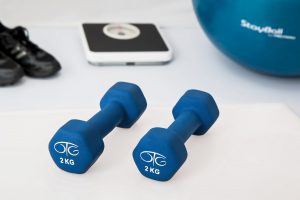Looking for ways to improve your overall health and well-being is essential, especially if you’re an older person. The good news is that living healthier doesn’t mean you have to completely transform your everyday routine or deplete your life savings. You can increase your chances at a longer and happier life by taking these small, budget-friendly steps towards better health.
Prioritize your gut health.
One thing that often gets overlooked in regards to overall health is the gut microbiome. Your gut is hom e to trillions of bacteria, fungi, and viruses—some of which promote health and some that have a negative impact. A proper balance of these microscopic organisms helps your digestive and immune systems function as they should, and it can also benefit your emotional health. Plus, a healthy microbiome can help reduce inflammation. Many people find it beneficial to use probiotics and prebiotics to boost their gut health. Probiotics can be found naturally in foods like yogurt and prebiotics in foods like chickpeas and bananas.
e to trillions of bacteria, fungi, and viruses—some of which promote health and some that have a negative impact. A proper balance of these microscopic organisms helps your digestive and immune systems function as they should, and it can also benefit your emotional health. Plus, a healthy microbiome can help reduce inflammation. Many people find it beneficial to use probiotics and prebiotics to boost their gut health. Probiotics can be found naturally in foods like yogurt and prebiotics in foods like chickpeas and bananas.
Exercise 20-30 minutes a day.
You’ve probably heard about the importance of exercise, and it may become even more important with age. A good rule of thumb is to aim for 150 minutes of moderate-intensity exercise each week, which means about 20 minutes every day or 30 minutes five days a week. These minutes can be broken down into segments throughout the day if necessary.
 Along with the many physical, mental, and emotional health benefits that exercise offers, it can also inspire better food choices and lead to better sleep. While many people prefer to join a gym, you don’t have to go that route to get a workout in. You can set up an exercise space at home and purchase affordable equipment like dumbbells or this yoga ball. To save even more money, many stores have coupons you can use at checkout.
Along with the many physical, mental, and emotional health benefits that exercise offers, it can also inspire better food choices and lead to better sleep. While many people prefer to join a gym, you don’t have to go that route to get a workout in. You can set up an exercise space at home and purchase affordable equipment like dumbbells or this yoga ball. To save even more money, many stores have coupons you can use at checkout.
Get your vital nutrients.
Decline in appetite is common among older people, which can make it challenging to get the nutrients your body needs to function at full capacity. Rather than reaching for the pasta, soda crackers, and sugary drinks, add some of these nutrient-dense foods to your diet:
- Kale
- Potatoes
- Garlic
- Salmon
- Egg yolks
- Blueberries
Buying foods like these at the market and incorporating them in your recipes is a cost-effective way to promote your health
Go to regular checkups. 
An annual physical exam can help you stay in front of any potential diseases or other health issues so that you can take action to prevent them or start treatments early in the process. Also, be sure to go to the dentist for an exam and cleaning every six months, as poor dental health can lead to issues like diabetes, cardiovascular disease, and pneumonia.
Furthermore, it’s important to get your eyes checked regularly to look for cataracts, glaucoma, and other conditions. Going to regular checkups will also reduce the likelihood of getting hit with expensive medical bills.
Guard your skin.
Lastly, your skin tends to become more susceptible to damage as you get older. When possible, try to stay indoors during the hottest parts of the day. When you are going out of the house, wear light-colored long-sleeved shirts, pants, and sun hats. Additionally, use generous amounts of high-SPF sunscreen. Remember that your skin can be affected by sun rays in any kind of weather.
Caring for your health doesn’t require you to revamp your entire life. Simply apply tips like these to your daily routine, and you’ll likely see big results. For more information and resources for older people, be sure to check out Empowerline.org.
Photo Credit: Burst



